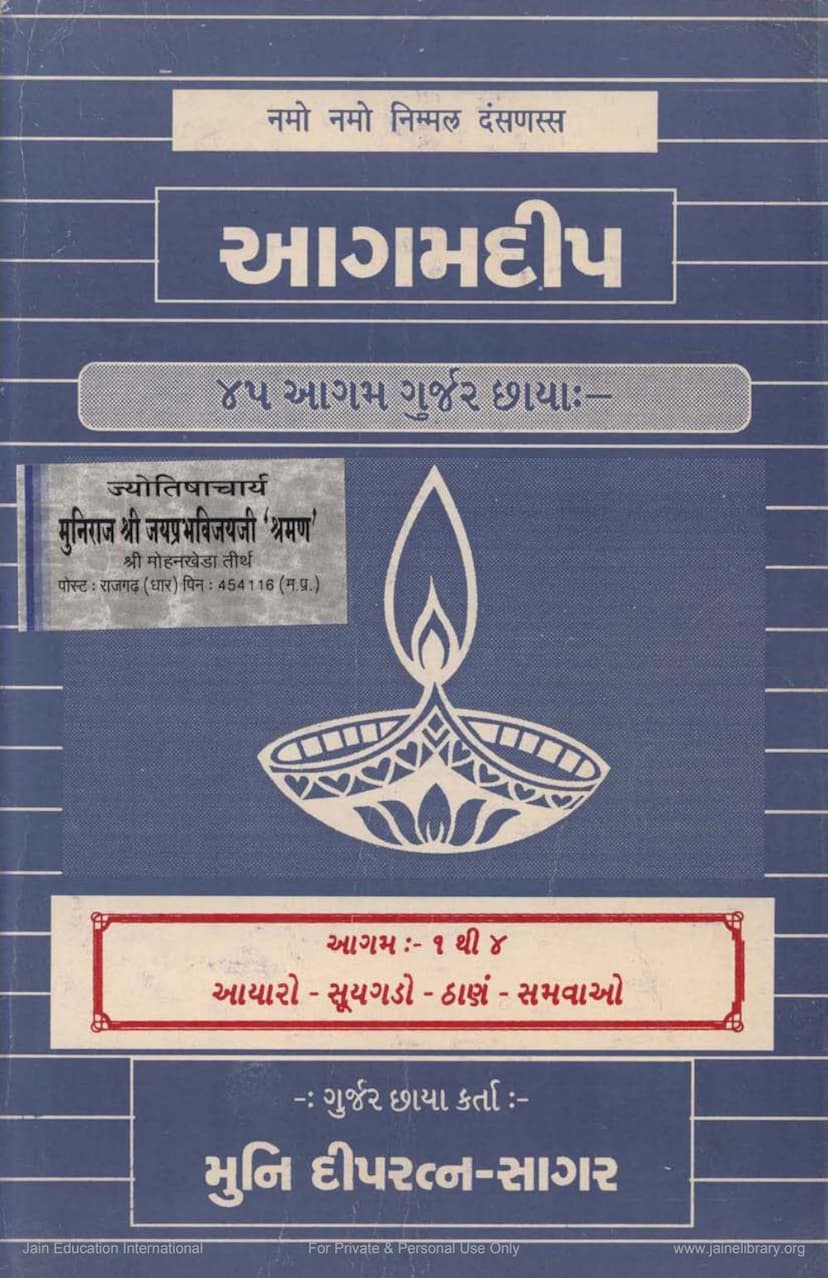Agam Deep 38A Jiyakappo Gujarati Anuvaad
Added to library: September 1, 2025

Summary
This document is the Gujarati translation and commentary ("Gurjar Chhaya") of the Jain scripture "Jiyakappo," which is the fifth Cheda Sutra. The work is titled "Agam Deep 38A Jiyakappo Gujarati Anuvaad" and is authored by Muni Dipratna Sagar. The publisher is Agam Shrut Prakashan.
Here's a comprehensive summary of the provided pages:
Core Subject:
The primary focus of the text is the Jiyakappo (Jivakappa), a Jain scripture dealing with the penances and expiations required for monks and nuns to purify themselves from offenses and maintain adherence to their vows. The commentary aims to explain these penances in Gujarati.
Key Concepts and Structure:
- Introduction and Salutations: The text begins with traditional Jain salutations to the Nirmal Darshan (pure faith), deities like Pavati Devi, and gurus.
- Agam-Deep Series: It is part of the "Agam-Deep" series, specifically Volume 38A. The book provides the Gujarati translation and commentary ("Gurjar Chhaya") for the first four Agams (Achara, Suyagada, Thana, Samavayo) as well, indicating a broader project.
- Classification of Penances (Prayshchitta): The core of the Jiyakappo, as explained in this commentary, revolves around the classification and application of various penances. The text details ten types of penances:
- Aalochana: Confession of faults.
- Pratikramana: Repentance and retracing steps.
- Ubhay (Aalochana and Pratikramana): Both confession and repentance.
- Vivek: Discrimination or careful selection.
- Vyutsarga: Abandonment or renunciation.
- Tapa (Asceticism): Performing austerities.
- Chheda: Cutting off or severance (implying a more severe penance).
- Moola: Root or fundamental penance.
- Anavsthāpya: That which cannot be established or reinstated (indicating a severe consequence or expulsion).
- Paranchit: Complete expulsion or excommunication.
- Detailed Explanation of Penances: The subsequent pages (starting from page 11) delve into the specific details of each penance:
- Aalochana (Pages 11-12): Discusses the purity gained through confession, especially when venturing outside for necessities like food or excretory functions, and the need for confession when interacting with monks from different sects.
- Pratikramana (Pages 12-13): Explains pratikramana for transgressions related to the three guptis (control of mind, speech, and body), five samitis (carefulness in movement, speech, eating, handling objects, and excretion), disrespect to gurus, breaking vows, minor falsehoods, theft, greed, improper use of the muhpatti (mouth cloth), etc. It also specifies the duration of pratikramana in terms of breaths (shvāsa-uśvāsa) or the "Logassa" sutra.
- Tapa (Asceticism - Pages 13-16): This is a significant portion, detailing various types of austerities (like Upavasa - fasting, Ayambila, Purimadhu, Ekāsana) prescribed for different offenses. It categorizes offenses based on:
- Jñanaachar (Conduct related to knowledge): Discusses transgressions in studying and teaching scriptures.
- Darshanachar (Conduct related to faith): Covers offenses related to the eight types of darshanāchāras (doubt, lack of faith, wrong belief, etc.).
- Charitra (Conduct/Discipline): While not explicitly detailed in the snippet, the context implies violations of monastic discipline.
- Upadhi (Possessions): Penalties for misuse, damage, or loss of monastic possessions like the muhpatti, rajoharan (broom), vessels, etc.
- Bhakshana (Eating): Offenses related to the time and place of eating.
- Other Specific Offenses: Includes actions like running, jumping, crying out, speaking loudly, engaging in sports, collecting specific items, improper interaction with animals, and offenses related to clothing and hygiene.
- Chheda (Pages 16-17): Discusses "Chheda" penances for those who are proud of their asceticism, lack faith in it, or repeatedly break vows. It also mentions penances for those who serve others while having broken vows themselves.
- Moola (Page 17): Deals with fundamental penances for grave offenses like causing harm to living beings, sexual misconduct, severe falsehood, theft, and greed. It also includes penances for those who have fallen from their faith or discipline.
- Anavsthāpya (Pages 18-19): Covers penances for serious transgressions, including those related to "linga" (religious vestments or conduct), "kshetra" (place), "kala" (time), and "tapa" (asceticism). It specifies duration-based penances for offenses of insult ("āshātanā") and consumption of forbidden items ("paḍisevaṇā").
- Paranchit (Pages 19-20): This is the most severe category, dealing with offenses like disrespect to Tirthankaras, scriptures, gurus, and repeated engagement in grave sins, including sexual misconduct and severe attachment. It outlines how these severe penances are to be administered and implies a potential for expiation and readmission.
- Contextual Factors for Penance (Pages 16-20): A significant part of the commentary emphasizes the importance of considering various factors when administering penances:
- Dravya (Substance/Object): The nature of the offense.
- Kshetra (Place): The location where the offense occurred.
- Kala (Time): The time of year or specific period.
- Bhava (Mental State/Intention): The intention behind the offense.
- Purusha (Person): The individual's spiritual maturity, strength, knowledge, and capacity to perform penance.
- Health (Nirogi/Glan): Whether the individual is healthy or ill.
- Abhagraha (Vows/Restrictions): Whether they have taken specific vows.
- Type of Penance: Whether it is a "Chheda," "Moola," "Anavsthāpya," or "Paranchit" penance.
- End of the Text: The commentary concludes by mentioning that the "Anavsthāpya" and "Paranchit" penances have been interrupted since the time of Acharya Bhadrabahu Swami, while other penances continue to be followed. It reiterates the importance of understanding the nuances of penances based on various factors.
Publisher and Supporters:
- Publisher: Agam Shrut Prakashan (Pages 2, 3).
- Key Financial Supporters: The publication of this volume was supported by various individuals and families, particularly Shrimati Naynaben Rameshchandra Shah Parivar, Vadodara (Pages 3, 5, 21). Other supporters are also listed, highlighting a community effort in publishing these Jain scriptures.
Overall Purpose:
The "Agam Deep 38A Jiyakappo Gujarati Anuvaad" serves as a guide for Jain monks and nuns (and by extension, the lay community seeking to understand monastic discipline) on the correct procedures and types of penances to undertake when transgressing their vows or guidelines. It emphasizes the importance of spiritual purification and adherence to the path of liberation through rigorous self-discipline and the application of appropriate expiations. The "Gurjar Chhaya" (Gujarati commentary) makes these complex scriptural teachings accessible to Gujarati-speaking readers.